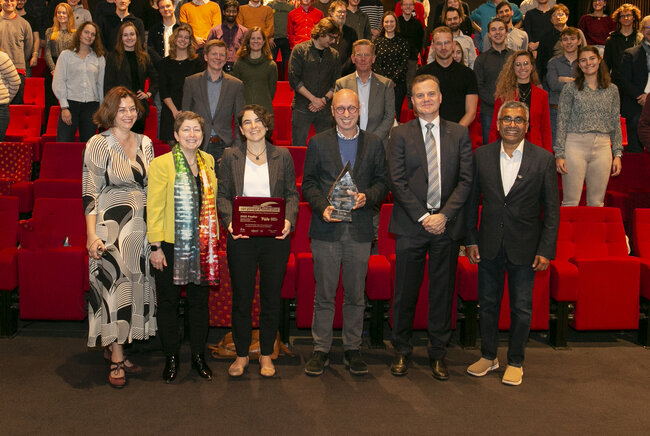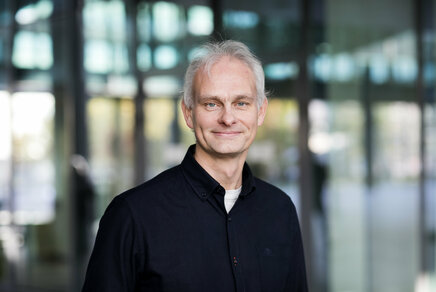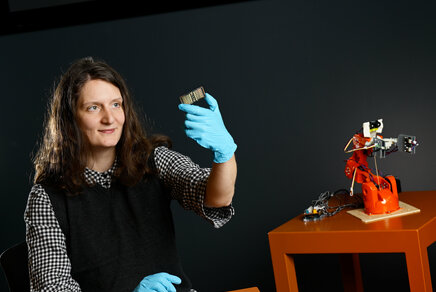Celebratory award ceremony for lauded mathematics master
Prestigious UPS George D. Smith Prize awarded to Operations Research and Analytics

Last April, TU/e associate professor Maria Vlasiou and alumna Anke Simons were presented at a conference in Texas with the UPS George D. Smith Prize for TU/e’s master’s program Industrial and Applied Mathematics (IAM). Today, it’s time for a celebration in Eindhoven, with guests from the US, students, staff members and partners from industry. Why was ‘our’ mathematics master’s program singled out for this prestigious award? And why is it that operations research is both invisible and omnipresent in our society?
It took Maria Vlasiou some effort trying to convince her colleagues that the department of Mathematics and Computer Science should compete for the prize. “That Dutch modesty!” the Greek-born associate professor says with a smile. The prize was created by shipping service UPS and is awarded by INFORMS, the world’s largest organization in the field of operations research.
Vlasiou, who also works as a full professor at the University of Twente, submitted a plea and heard in January that TU/e was among the three finalists. “We may not have to names and the money of previous winners, such as MIT, but the basic principles of our IAM master’s program are sound and innovative.” This was confirmed when TU/e was declared the winner during the award ceremony in Houston, Texas on April 4, ahead of its competitors Purdue and University of Toronto. Vlasiou was there to accept the award, together with alumna Anke Simons.
Highlight
Now, it is the turn of representatives of INFORMS and UPS to be guests in Eindhoven. The highlight of the visit is a program with festivities this Friday afternoon, November the 11th, in movie theater de Zwarte Doos. “I want to celebrate with students, colleagues and our partners from industry,” Vlasiou says. “For the first time ever, a university from outside North America was awarded this prize,” executive director at INFORMS Elena Gerstmann (on the right in the photo above) says. “And deservedly so: TU/e has the best teaching program in this field.”
What makes IAM such an excellent master’s program? Vlasiou: “In Europe, we have the advantage of the Erasmus program, and this makes us very international. And within the Netherlands, all mathematics master’s programs work together, which allows us to offer a wide variety of courses. But what makes our IAM master’s program in Eindhoven truly unique, is the fact that collaboration with industry and social partners has been fully integrated with our teaching activities. Students solve real problems from the outset, and in doing so acquire the technical abilities, soft skills and contacts they need in their careers.”
Robot vacuum
The term operations research was first used in Britain during World War II, Vlasiou says. “The British armed forces had to defend the nation as best they could against bombings by the Nazis, with limited means of defence and with hardly any knowledge of the enemy’s plans.” Mathematicians determined how to optimally utilize resources, and they could prove it.
After the war, countries in the west started to use that knowledge in industry for different purposes, for example to optimize supply chain operations. And then the internet came. “Today, it’s everywhere,” Gerstmann and Vlasiou emphasize. They cite a few examples: the cleaning route of a robot vacuum, the design of complex teaching timetables, the planning of package delivery services – it’s not without reason the UPS initiated and finances the prize –, the setting of traffic lights, and airport logistics.
“In short: every organization has a mathematical problem that we can help solve,” Vlasiou says. She considers it her mission to make organizations aware of the fact the math is a solution to complex problems. And she wants to tell the younger generation that math can be applied in all kinds of ways. “When I ask high school students what kind of a job they think they can get if they study math, all they usually come up with is teacher or bank employee.” Gerstmann agrees. “We call it ‘the most important invisible profession’ –, math is everywhere, but people don’t see it.”
The roots of this field, incidentally, lie to a significant extent in Eindhoven, with pioneers like Edsger Dijkstra and Jacques Benders. “People benefit from Dijkstra’s work daily,” Vlasiou says resolutely. “Google Maps, for example, uses his algorithms to determine within three seconds the optimal route from Eindhoven to a random city in, say Poland.”
Saving lives
INFORMS believes that operations research should be applied to help solve economic as well as social issues, for example to compute an optimal Covid-19 vaccine distribution among the population to prevent scarcity. An optimal distribution of mosquito nets in areas where malaria is common? Or the best way to allocate kidneys among patients on a transplant waitlist? “Use math for good,” Gerstmann says: “Math doesn’t just save money, it can also solve major issues and save lives.”
Is it fair to say that operations research offers an objective solution to ethical questions? It’s work that still needs to be carried out by human beings, Gerstmann says. “Sometimes, a researcher might unintentionally add a bias to an algorithm.” The ethical aspect to a problem makes it even more important that mathematicians can explain the evidence of their solutions, Vlasiou adds. “And ethics is one of the most important soft skills we address in the IAM master’s program.” “However, we need to stay alert, and that’s why it’s so important that we are a community and that we keep each other on our toes. We are glad that TU/e has now joined that family,” Gerstmann says in conclusion.
Source: Cursor
Also see this earlier article about the granting of the George D. Smith Prize
Media contact
Latest news


